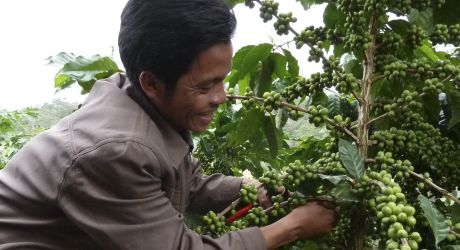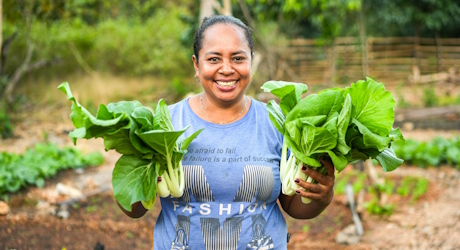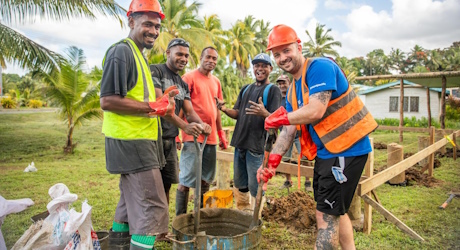Footprints Project
Since 2005, travelers like you have helped us change the world through micro-donations.

-
A total of
8259
Travelers
-
donated
$25027.37
(100% funded) -
to help improve
Food Security
-
in
Lao PDR
Project Background
More than 70 per cent of the population of Laos depend on farming to make their living. Working on their farms every day many still struggle to find a market for their coffee. When they do, they don’t always make enough to provide for their family.
CARE’s Boosting Coffee Production project in Dak Cheung district aims to help remote ethnic women and their communities increase their income and lift their families out of poverty through the coffee market. Small scale farmers, particularly women, are often excluded from the market due to their low income and low position.
With your help, we will help address this inequality, training farmers to increase their yields, produce higher quality coffee and helping connect them with international markets. The project will also focus on improving nutrition, as severe malnourishment is endemic in many remote communities.
Project Overview
Laos is one of the most ethnically diverse countries in South-East Asia. In rural and remote areas, 65 per cent of the population is made up of more than 100 ethnic groups. Although a complex issue, there is a strong link between ethnicity and poverty, particularly in upland areas. Often women are among those most at risk of not benefiting from the economic change happening in Laos, as they are left out of decision making and bear the burden of unpaid work caring for households.
Coffee is the country’s most valuable agricultural export, and by supporting this project you will help women farmers break into the industry and create links to the international coffee markets so that they can improve their income.

The project will help women form village savings groups to build their financial skills and get access to small loans so that they can grow their businesses even further. Coffee growing is not only a valuable source of income, but also crucial in terms of improving food security. By diversifying farming practices, families will also develop skills to plant and grow other crops and improve their overall nutrition. With increased income and improved farming techniques, women can lift themselves out of poverty, families will have better nutrition and their children will have brighter futures.
Project Objectives
Following a review the project goals were revised during this reporting period. The current objectives are below:
- Ethnic minority women within the Arabica coffee chain are empowered through strengthened technical skills and improved productivity.
- Ethnic minority women farmers benefit from increased income and profitability in the Arabica coffee chain.
- Ethnic minority women producers are valued and influential members of the Arabica coffee value chain.
Project Activities and Results
CARE’s Boosting Coffee Production project was launched in July 2017. Delays, to refine the strategy, postponed the signing of agreements with local authorities and the start of some work but many activities were still able to commence. With your help, CARE has made developments in the following areas over the past 12 months:
Introducing life-changing education
The first year’s focus has been on supporting coffee producers to understand the potential of increased production by analysing their current methods and demonstrating how these could be substantially improved to increase farmers’ income.
Nine trainers (five female, four male) were trained in the first three modules of Linking Agriculture Natural Resources Management and Nutrition (LANN). The trainers were then able to begin educating nine communities, with a focus on couples who have children under the age of five.
The program also focuses on the importance of having food available throughout the year, caring for children and mothers, and hygiene and sanitation. It highlights the importance of eating a diverse range of food and how different foods help the body. It also helps to foster cultural change in gender inequalities, and improve the overall health of women and their families.

Increasing income and profitability
- Village Savings and Loans Associations have been established in seven villages (92 members, all female) generating total savings of approximately $1,290 USD over five months. Women have been trained in management, relevant regulations and bookkeeping.
- 87 women across 30 villages received on the job training in intercropping produce in coffee plantations, such as cabbage, peanuts and mung beans. This improves nutrition and soil quality.
- 48 of these women were also trained in the establishment and management of coffee nurseries and coffee gardens. These women will play pivotal roles in sharing their skills and best practice with other producers in their villages.
- 30 villages received basic training in analysing and making informed decisions on the market. This is a positive shift in behaviour and skills in collective management of savings, which is promising for the future.
- 48 female workers, in 13 villages, were trained in improving the quality of production — including compost, fertilisers and pruning. The most engaged participants in each village were selected to establish ‘demonstration plots’ which serve as powerful visual example of increased production. This strategy will be extended to an additional 17 villages.
- CARE and 30 members of the Coffee Producer Group worked together to purchase materials and equipment for the community coffee gardens, which improved their negotiating skills.

Creating strong networks
A close relationship was established with the Coffee Producer Cooperative which will help build the skills of local producers and improve their access to the coffee market.
A long-term agreement was signed with a coffee sector expert who will provide ongoing training to CARE staff and workers in successful trading and investing in better quality products, as well as giving them access to extensive networks. Two potential buyers committed to promoting coffee from poor and vulnerable ethnic communities, were identified.
Increasing gender equality and disability inclusion
A strategy was formed to implement the next phase of the project. It focused on strengthening women’s self-confidence, engaging men, improving the capacity of staff and local partners, and advocacy.
Techniques have been developed to improve negotiation skills and collective strategies for women-led coffee processing groups. These will be undertaken in the next year of the project, and include working together, training in leadership, increasing networks, increasing dialogue between the groups, and local government and compa- nies, improving the quality of product and improving negotiation skills.
Within the communities engaged in this first year of the project, 29 adults (19 female) and 12 adolescents (5 female) have a disability.
You are helping ethnic minority women increase their income. Thank you for your support!
Traveling soon? When you buy travel insurance with us, you can make a contribution towards a cause you care about.
Get a quote






